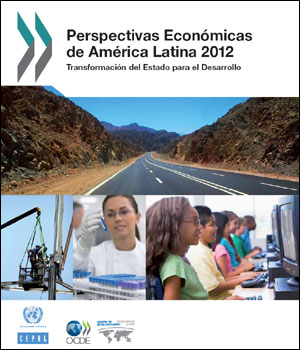Transform Growth into Economic and Social Development, Say OECD and ECLAC
The report LEO 2012 recommends that the region implement new policies to enhance competitiveness and economic diversification.

(28 October 2011) Despite the global economic downturn, the economy of the Latin American and Caribbean region grew 5.9% in 2010 and is expected to climb by 4.4% this year. To ensure continued progress, these regions must now turn such growth into sustainable economic and social development, according to OECD and ECLAC's 2012 Latin American Economic Outlook presented at the XXI Iberoamerican Summit in Asunción.
"Countries enjoying high economic growth should take advantage of the opportunity to make the structural and social reforms necessary to ensure that the growth is sustainable," said OECD Secretary-General Angel Gurria. "Latin America and the Caribbean governments should build on recent achievements to address both short-term and long-term challenges such as diversifying their economies, carrying out fiscal reform and giving their citizens better public services. Attention should focus on education, infrastructure and the promotion of innovation."
The Latin American Economic Outlook recommends that the region implement new policies to enhance competitiveness and economic diversification. Natural resource-intensive sectors still make up 60% of manufacturing value-added in Latin America. And primary goods and manufactured items based on natural resources represent up to 50% of the region's exports. With one in three Latin Americans - 180 million people - living below the poverty line and ten of the countries in the region ranking in the 15 most unequal in the world, a more diversified and productive economy is critical to sustaining and improving growth and to reducing inequality.
Despite progress in macroeconomic management and in their ability to attract foreign investment, Latin America's economies are still vulnerable to the ups and downs of the volatility, inflation and currency fluctuations of the global economy. In the short-term, Latin American and Caribbean states must broaden the fiscal space necessary to respond to negative shocks from international markets.
The Latin-American and Caribbean States should also address long-term challenges and structural issues. For example, in 2008 Latin America´s tax revenues were 19% as a share of GDP, just over half the 35% collected on average across the OECD. Increasing the level of tax revenue would allow Latin American governments to invest more and improve public services.
The report notes that the region should also promote more transparent public management. "Latin American and Caribbean economies have shown a significant resilience to the effects of financial crisis and its recovery has been faster than in other regions", noted Alicia Bárcena Ibarra, Executive Secretary at ECLAC. "In order to consolidate these achievements and take concrete actions, the region should encourage new models of governance, stronger institutions and public policies capable of mobilizing a wide range of actors".
Whilst the quality of education has improved, significant gaps remain. OECD PISA literacy tests show that almost 50% of Latin American students in secondary education fail to reach the minimum acceptable level, compared to the OECD average of fewer than 20%. To narrow this gap, countries in Latin America and the Caribbean should guarantee high-quality primary education and equitable access to secondary and tertiary education.
To improve the efficiency of its transport and energy sectors, the region should increase coordination across agencies and different levels of government, and enforce deals reached with the private sector.
Finally, low productivity and weak national innovation systems remain persistent problems for the region. Newly created ministries and agencies dedicated to innovation in Argentina, Brazil and Chile are very good signs of progress, but more active and coordinated innovation policies are needed.
For further information, please contact:
Elodie Masson (OECD). Email : elodie.masson@oecd.org; Tel. : +33 (0)1 45 24 82 96.
ECLAC Public Information and Web Services Section. E-mail: dpisantiago@cepal.org; Tel.: (56 2) 210 2040.
Follow us in: Twitter, Facebook, Flickr and YouTube.
Contact
Public Information Unit
- prensa@cepal.org
- (56 2) 2210 2040